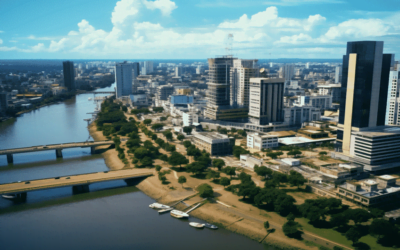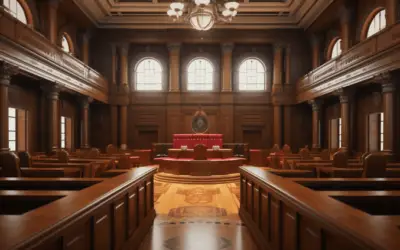Hey there, fellow drone enthusiasts and curious readers! If you’ve found your way to this page, you’re likely on a quest to unravel the mysteries of the Bahamas’ drone laws, right? You’re not alone!
Navigating drone regulations can be quite a challenge, but fret not; I’ve got you covered. Whether you’re a drone hobbyist, a budding pilot, or just someone keen to know what’s up with drones in this tropical paradise, you’re in the right place.
I’ve delved deep into the world of Bahamian drone laws to bring you the most up-to-date and practical information.
It’s not just a simple Google search; it’s a journey of research, phone calls, and conversations with local experts, all to make sure I provide you with the most accurate and trustworthy guidance.
We all know that when it comes to drones, one size doesn’t fit all, and the law is no exception. So, I’ve tailored my research to address the nuances and complexities you might face.
So, here’s the deal. If you want to soar into the Bahamas skies with your drone, you’ve come to the right place. I’m about to share all the crucial details, the dos and don’ts, and even some insider tips to help you navigate The Bahamas’ drone laws with confidence.
You’re just a scroll away from finding the solution to your drone-related queries. Stick around, and let’s unravel the Bahamas’ drone laws together!
- The Bahamas Registration and Licensing Requirements
- The Bahamas No-Fly Zones and Restricted Areas
- The Bahamas Drone Operational Limits
- The Bahamas Safety and Privacy Considerations
- The Bahamas Drone Importing and Exporting Drones
- Commercial Drone Operations
- The Bahamas’ Penalties for Violating Drone Laws
- Resources and Contact Information
- Final Thoughts On The Bahamas Drone Laws
The Bahamas Registration and Licensing Requirements

Alright, let’s dive into the nitty-gritty of drone regulations in the Bahamas. When it comes to flying your trusty drone in this beautiful archipelago, there are some hoops to jump through.
Buckle up; I’m here to break down the registration and licensing requirements for you, just as if we were chatting over a coffee.
Do You Need to Register Your Drone?
First things first, do you need to register your drone in the Bahamas? Well, the answer is yes, but it’s not as straightforward as it might seem.
The Bahamian government has recognized the growing popularity of drones and their potential impact.
So, if your drone tips the scales at 250 grams or more, you’re expected to register it with the local authorities. Think of it like getting a driver’s license for your drone, but not as complicated.
Obtaining Your Drone Operator License
Now, what if you’re planning to go pro with your drone and make a little business out of it? In that case, you’ll need a drone operator’s license. This isn’t too different from getting a driver’s license to become a taxi driver.
You’ll need to apply for this license, and the process involves providing some basic personal information, details about your drone, and, of course, a dash of patience. It’s not as complicated as learning to fly the drone, though, I promise.
Recreational vs. Commercial: What’s the Difference?
But wait, what’s the deal with recreational and commercial drone operations? The distinction here is quite important. If you’re flying your drone for fun to capture stunning aerial shots of the Bahamas’ breathtaking landscapes, you’re likely in the recreational category.
You’ll still need to register your drone, but you won’t need the full-blown operator license. However, if you’re planning to use your drone for profit, maybe offering aerial photography services, you’re in the commercial zone. In that case, you’ll need that operator license to turn your passion into a business.
So, remember, whether you’re capturing dreamy sunsets on the beach or creating the next blockbuster drone documentary, understanding the registration and licensing requirements is key to staying on the right side of The Bahamas’ drone laws.
It’s not as intimidating as it might sound, and it ensures that our drones can soar the Bahamian skies responsibly.
Also Checkout: Albania Drone Laws 2024
The Bahamas No-Fly Zones and Restricted Areas

Now, let’s talk about the less breezy side of drone flying – the no-fly zones and restricted areas in The Bahamas. Picture it as a treasure map with areas marked “Here Be Dragons,” but instead of dragons, you’ll find strict regulations. Buckle up, we’re navigating the no-fly zones.
Where Not to Fly
The Bahamas is an enchanting place with its fair share of stunning spots, but not all of them are open skies for drones. Think of it this way: just like you wouldn’t wander into a stranger’s backyard, there are places drones aren’t supposed to venture.
Airports are like Fort Knox in the drone world, strictly off-limits. Government buildings and military installations? Think of them as the crown jewels; you admire them from afar.
And hey, we all love a good lighthouse, but those are a no-go for drones as well. These are the designated no-fly zones and restricted areas that you need to keep in your drone’s GPS no-fly list.
Safety and Security Matter
Why all the fuss about no-fly zones? Well, it’s not about raining on your parade; it’s about keeping the skies safe and secure. Imagine you’re at a crowded concert and someone decides to fly a drone overhead—not so fun, right?
Imagine that drone buzzing near an airport runway. We’re talking about potential accidents, disruptions, and concerns about national security. It’s like ensuring everyone in a theater follows the safety rules; it’s for the well-being of everyone.
Respecting these restrictions isn’t just about avoiding trouble; it’s about being a responsible drone pilot and contributing to the safety and security of this beautiful island nation.
Remember, understanding and respecting the no-fly zones is like mastering the map of hidden gems in a new city; it ensures your drone adventure is not just thrilling but also safe and respectful of the local rules. So, let’s steer our drones clear of the dragons and enjoy the skies responsibly.
Also Checkout: Afghanistan Drone Laws 2024
The Bahamas Drone Operational Limits

Now, let’s get into the specifics of how high and far your drone can roam in the Bahamian skies. It’s kind of like knowing the speed limit on different roads, except these limits are in the air. Buckle up; we’re about to explore the operational limits.
The Altitude and Distance Rules
So, how high can you go, and how far can your drone travel in The Bahamas? Well, there are limits to the freedom of the skies. Imagine it’s like a leash for your drone; you’ve got to keep it within your sight at all times.
The general rule here is to stay below 400 feet (about 120 meters) above ground level. That’s like having a 40-story building as your drone’s personal limit.
Now, about the distance, this can be a bit trickier to grasp because it depends on your specific situation. In most cases, you’re expected to keep your drone within 500 meters of you and away from people, buildings, and vehicles.
It’s kind of like walking your dog in a park—you don’t let them wander too far from you, ensuring they don’t bump into things.
Variations in Limits
Here’s where it gets interesting: these limits aren’t set in stone. They can vary based on a few factors. For instance, if you’re flying a smaller drone, there might be different rules for you compared to someone with a larger, more powerful one.
Commercial drone pilots often have more flexibility, especially if they’ve passed the rigorous training and obtained the necessary licenses.
Additionally, your location plays a big role. Near airports, you’ll have to be extra cautious and keep your drone at lower altitudes and shorter distances to ensure the safety of the aircraft.
It’s kind of like slowing down when you approach a busy intersection while driving. These variations might sound complex, but they’re all about maintaining safety in the skies.
Understanding the operational limits is like learning to navigate your neighborhood; it’s about keeping your drone in check, staying safe, and making sure your aerial adventures don’t ruffle any feathers. So, go ahead, and explore, but always within the boundaries of the Bahamian drone laws.
Also Checkout: Algeria Drone Laws 2023
The Bahamas Safety and Privacy Considerations

Now, let’s talk about being a responsible drone pilot in The Bahamas. It’s not just about the laws; it’s about being a good neighbor in the sky. Think of it like driving on the road – you want to be courteous and safe. So, let’s dive into the important aspects of safety and privacy.
Respect the Privacy
When you’re up there in the skies with your drone, it’s easy to forget that you’re not alone. Just like how you wouldn’t peep into someone’s living room window, it’s crucial to respect the privacy of individuals on the ground.
Be mindful of people’s personal space, and avoid flying your drone over private property without permission. It’s like treating the airspace above someone’s home as their “airspace privacy zone.”
Emphasizing Safety Guidelines
Safety is paramount when you’re flying a drone. Remember, your drone isn’t just a fun toy; it’s a machine that’s cruising in the sky. Maintaining a visual line of sight with your drone is crucial – it’s like keeping your eyes on the road when driving.
And reckless flying? That’s a no-no. It’s kind of like obeying traffic rules to avoid accidents. Follow the general safety guidelines, stay away from no-fly zones, and keep a buffer from people and objects. This way, you’ll ensure both your drone and the people below stay safe.
Understanding the importance of safety and privacy when operating a drone is like driving responsibly and respecting the rules of the road.
It’s about making sure that your drone adventures are enjoyable, considerate, and accident-free. So, let’s soar the Bahamian skies responsibly and with respect for others.
Also Checkout: Australia Drone Laws 2024
The Bahamas Drone Importing and Exporting Drones

Flying your drone in Bahamian paradise can be exhilarating, but what if you’re traveling in with your drone in tow or considering selling your trusty bird overseas?
Well, just like clearing customs at an airport, there are some regulations to navigate when it comes to importing and exporting drones. Let’s break it down.
Importing Drones into The Bahamas
Bringing your drone into The Bahamas? Welcome! It’s not as complex as you might think, but there are some hoops to jump through.
You’re not just strolling through the customs line; you’ve got to provide some essential details about your drone.
Think of it like declaring your souvenirs from your travels; just instead of trinkets, you’re letting the authorities know about your drone’s make and model.
The idea is to ensure that your drone meets the safety and legal standards set by the Bahamian government.
Customs and Traveling with Drones
Now, what if you’re a drone enthusiast who loves jet-setting across the globe with your flying buddy? You’ll want to know about the customs and import/export requirements. Think of it as checking the baggage allowance for your drone.
Different countries have different rules, and it’s your responsibility to make sure you’re not breaking any rules when you’re traveling with your drone.
Always check in advance and be prepared to comply with the regulations of the destination country.
Understanding the ins and outs of importing and exporting drones is like preparing for an international journey with your trusted companion.
It’s all about ensuring that your drone is on the same page as the local laws and customs procedures, so you can have a hassle-free and legally sound drone experience. So, fly on, fellow drone enthusiasts, and explore the world, one flight at a time.
Also Check: Andorra Drone Laws 2024
Commercial Drone Operations

So, you’ve decided to turn your passion for flying drones into a business venture in the Bahamas? It’s an exciting step, but just like any business, there are some extra steps to take.
Let me walk you through the specific requirements for commercial drone operations in this beautiful island nation.
Extra Requirements for Commercial Ventures
Going commercial with your drone involves a bit more paperwork and responsibility, much like starting a small business. It’s not as complex as filing taxes, but it’s important to understand what’s needed.
One key requirement is the drone operator license, which you must obtain from the Department of Civil Aviation (Civil Aviation Authority Bahamas). This license showcases that you’ve got the necessary skills to operate your drone professionally.
It’s like getting a chef’s certificate before opening your restaurant; it ensures you’re serving up quality, and in this case, safe, drone services.
The Need for Liability Insurance
Insurance—it’s not the most exciting topic, but it’s a critical aspect of commercial drone operations. You’ll need liability insurance. Think of it like the insurance you’d get for your business.
This insurance helps protect you and others in case of any unfortunate incidents involving your drone. If your drone unexpectedly crashes and causes damage, you’ve got your bases covered.
It’s a lot like a restaurant having insurance for accidents—it’s a safety net that keeps things running smoothly.
In addition to liability insurance, there might be specific requirements and certifications needed for certain industries. For example, if you’re using your drone for aerial photography or videography, you may need additional certifications to ensure the quality and safety of your work.
Turning your drone hobby into a commercial operation is like opening a new chapter in your career. It’s exciting, but it comes with extra responsibilities.
The key is to stay informed, obtain the necessary licenses, and ensure you’re well-prepared with the right insurance and certifications.
By doing so, you’re not just ensuring your business is legal; you’re also demonstrating your commitment to providing professional and reliable drone services in The Bahamas.
Also Checkout: Antigua and Barbuda Drone Laws 2023
The Bahamas’ Penalties for Violating Drone Laws

While drone flying is undoubtedly exciting, it’s crucial to stay within the legal boundaries. Breaking drone laws in the Bahamas isn’t just about fines and legal complications; it’s about ensuring that our skies remain safe for all. Let’s talk about the potential penalties for not playing by the rules.
Potential Penalties and Consequences
So, what happens if you disregard drone regulations in The Bahamas? Well, it’s a bit like getting a speeding ticket—it can be costly. Penalties may include fines, confiscation of your drone, or even legal action.
Depending on the nature of the violation and its impact, you could find yourself in a bit of a legal pickle. Think of it as facing legal consequences when you break any other law – there’s no free pass in the sky.
Compliance is Key
Now, let’s talk about the silver lining. Compliance with drone laws is like following the road rules; it keeps everyone safe and happy. By adhering to the regulations, you not only avoid penalties but also contribute to the responsible use of drones.
It’s a bit like sticking to the rules of the road to avoid accidents; it’s a collective effort to ensure that the sky remains open for all drone enthusiasts.
So, remember, compliance isn’t just about avoiding trouble; it’s about being a responsible drone pilot and keeping our Bahamian skies enjoyable for everyone.
Understanding the potential penalties for violating drone laws in The Bahamas is a bit like realizing that obeying traffic laws isn’t just about avoiding speeding tickets; it’s about keeping the roads safe.
Similarly, staying within the drone laws is about ensuring a safe and enjoyable environment for all drone enthusiasts. So, let’s fly responsibly and with respect for the laws and the community.
Also Checkout: Argentina Drone Laws 2024
Resources and Contact Information

Knowledge is power, and when it comes to drone regulations, it’s vital to have the right sources at your fingertips.
So, I’ve got your back with a handy list of resources and government contacts to help you stay on top of the ever-evolving drone laws in The Bahamas. Think of it like a GPS to navigate through the world of regulations.
In case you have any questions, need the most recent updates, or want to double-check something, you can rely on official sources (Civil Aviation Authority Bahamas).
These are like the experts in the field, providing you with the most accurate and current information about drone laws in The Bahamas. So, let’s dive into these resources.
Now, for the contact information: You may find yourself needing some clarification or have specific inquiries about drone regulations.
Think of these government contacts as your friendly neighborhood support center, ready to assist you with your drone-related queries.
Whether it’s the Department of Civil Aviation or other relevant authorities, these contacts are your go-to people when you need to get in touch for official information.
Now, armed with these resources and contacts (Tel: (242) 397-4700),
Fax: (242) 326 3591, and you’re all set to embark on your Bahamian drone adventures with confidence and responsibility.
It’s like having a tour guide with you, ensuring that you’re well-informed and prepared for any drone-related questions or situations that may arise. Happy flying, and may your drone adventures in The Bahamas be safe and memorable!
Also Checkout: Armenia Drone Laws 2024
Final Thoughts On The Bahamas Drone Laws

So, we’ve taken quite a journey through the skies and the laws that govern them in The Bahamas. It’s been a bit like exploring a new land, filled with adventure and new experiences.
But now, as we wrap up our drone law discussion, it’s time to summarize what we’ve learned and why it all matters.
From registration and licensing requirements to respecting no-fly zones and understanding operational limits, we’ve unraveled the essentials of flying a drone responsibly in this island nation.
Just like learning the rules of the road before getting behind the wheel, understanding these regulations ensures safe and enjoyable drone operations.
The key takeaway here is the importance of responsible and safe drone operation. Think of it as the golden rule for drone pilots: your fun shouldn’t come at the expense of others’ safety or privacy.
By following the laws and guidelines, you not only avoid legal troubles but also contribute to maintaining a harmonious and safe drone environment for all.
In the end, our Bahamian drone adventures are only as good as our ability to share the skies responsibly.
So, whether you’re capturing stunning sunsets, surveying landscapes, or venturing into commercial endeavors, let’s do it with a deep respect for the rules, for each other, and for the sky itself. Fly high and fly safe in The Bahamas!













